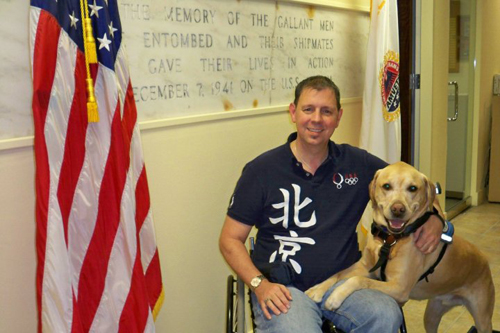
Jonah
U.S. Army veteran Kevin Stone’s early retirement from service after being spinal cord injured left a big hole in his life, that is, until he found a couple of new best friends––his service dogs.
Service dogs are trained to help people living with physical and psychological disabilities such as spinal cord injuries, as well as post-traumatic stress disorder (PTSD) and severe depression. They can perform a variety of tasks, from pulling a wheelchair to fetching dropped items. Service dogs can also help break down barriers between people with disabilities and society, enabling many to access new opportunities that once seemed out of reach.
Stone has owned two service dogs since his injury, Jonah––a blond labrador retriever, and Mambo––a 50/50 hybrid mix of golden retriever and yellow labrador retriever. He credits his first dog Jonah with his initial recovery. “She motivated me to overcome my injury and become who I am today,” Stone said.

Mambo
Jonah’s successor, Mambo has been with Stone for the past 4 years. Along with helping with physical tasks and his mobility issues, Mambo has empowered Stone to rediscover a sense of purpose since leaving the Armed Forces.
“My injury stripped me of the person I was trained to be. Mambo not only brought back my freedom and independence, but also gave me an opportunity to serve my country in new ways,” Stone said.
With his dogs by his side, Stone, a member of AMVETS, replaced his camo and fatigues with a few new uniforms. He has competed as a U.S. Paralympian in Athens in 2004 and Beijing in 2008, winning a bronze medal in archery and raising the American flag on foreign soil. He was also a coach and mentor for the U.S. Paralympic Committee’s Military Program and served his community as a veterans service officer.
Jonah and Mambo have opened many doors for Stone, but his local VA hospital isn’t one of them. Unfortunately, some VA facilities prohibit service dogs from entering. The only dogs fully-protected by law to enter all VA facilities are guide dogs, which are used by people with vision problems. The VA has left it up to each facility’s discretion whether or not to permit access to service dogs.
Stone has experienced firsthand the frustration of being turned away from a VA facility because of his dog. He was recently denied Inpatient Services at Charlie Norwood VA Medical Center in Augusta, Georgia and missed important medical appointments because officials said Mambo presented too many risks to let in. The hospital was mainly concerned with Stone’s ability to care for his dog and the threat of “zoonotic disease transfer”.
“As far as I know, other than microbes and small biologics that could be passed by floating dander or a shed of fur, the only ‘zoonotic disease’ a canine can transfer is the topical ringworm which would have to be transferred from a human host first,” Stone explained.
“Obviously, there are certain areas of VA facilities where dogs should not be allowed, such as burn units or other sensitive sterile areas. But if a veteran is attending a group meeting or appointment, why shouldn’t their service dog be allowed in,” he added.
Thousands of veterans like Stone view service dogs as crucial vehicles to pursuing active lifestyles. For many, they are not a luxury, but a necessity.
“They are motivational prosthetics of freedom. Service dogs are just as important as someone’s wheelchair. Without them, many veterans living with disabilities would be lost.”
There are currently two pieces of legislation that would help protect the rights of veterans who use service dogs, while also ensuring these animals are available to a larger portion of the disabled veteran population.
The first bill, the Veterans Equal Treatment for Service Dogs Act (H.R. 1154), introduced by Congressman John Carter, R-Texas, ensures that all veterans with disabilities who use service dogs are able to access VA facilities. In the Senate, S. 769 would also provide similar protections.
The second bill, the Veterans Dog Training Therapy Act (H.R. 198), introduced by Congressman Michael Grimm, R-N.Y., would create a pilot program to determine whether veterans with post-deployment mental health concerns, such as post-traumatic stress disorder could benefit by participating in the training of service dogs for fellow veterans.
VetsFirst, AMVETS, and other advocacy groups have joined Stone to educate the public and politicians on Capitol Hill about the positive impact that service dogs have on the quality of life of veterans living with disabilities nationwide. Mambo has also become a major player in these efforts.
“My dog has become a politician, and a damned good one,” Stone said.

Kevin with his service dog Mambo
Although there has been widespread support for H.R. 1154, the Veterans Dog Training Therapy Act has received opposition––most notably from the VA Principal Deputy Undersecretary for Health Dr. Robert Jesse. He has stated the bill is “unworkable”, explaining that it would require the evaluation of a large and very detailed list of factors, many of which cannot be measured.
Stone disagrees, stating, “As long as the VA applicant screening process is performed correctly and the dogs are properly trained through accredited training programs there is no reason this bill cannot succeed in helping veterans with PTSD and other mental health issues.”
According to Stone, pairing veterans with properly trained dogs through a VA accredited program would also solve the growing problem of many veterans obtaining “quick fix” service dogs through unaccredited suppliers.
“You can go online, fill out a few forms, and purchase service dog certification IDs, packs, vests, and patches quite easily. There is no accountability. Without proper accreditation from organizations such as Assistance Dogs International Inc. or the International Guide Dog Federation these items mean nothing. Most veterans are learning that the hard way. They are getting stuck with the dogs that are not well-trained that they end up donating or having to pay to get retrained.”
Related articles: Service Dogs-A Veteran’s Best Friend
Tom Scott
Staff Editor, VetsFirst
